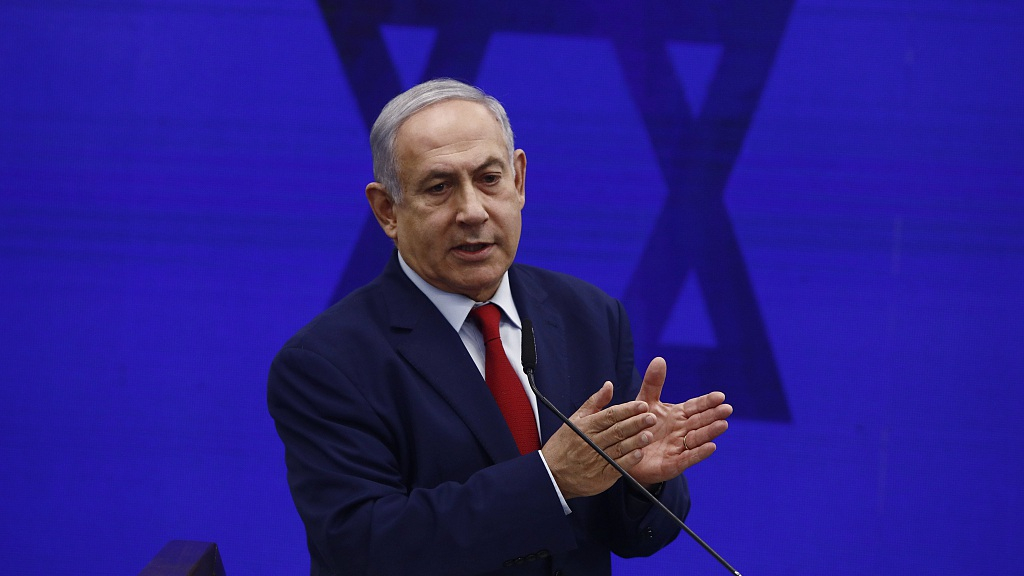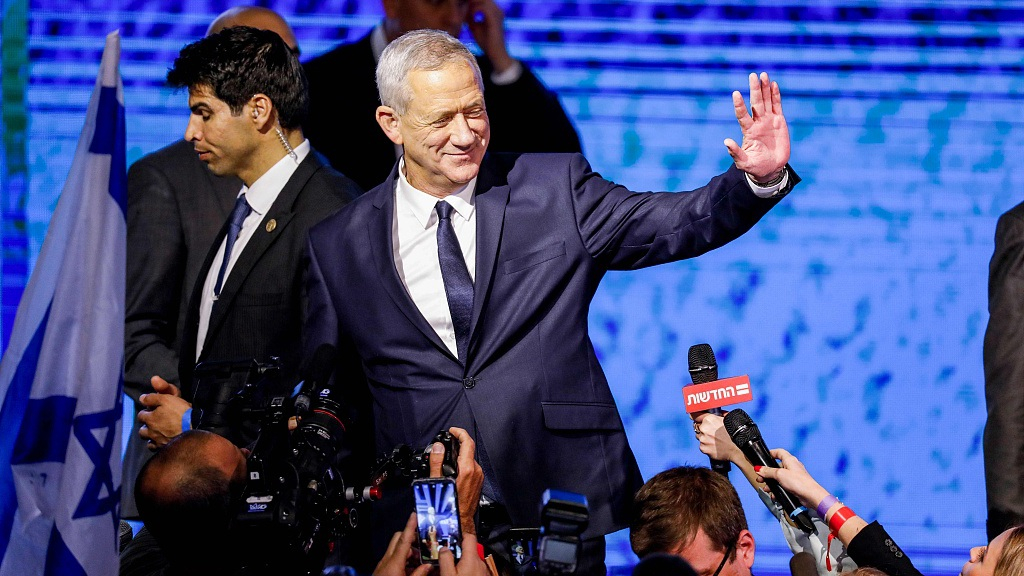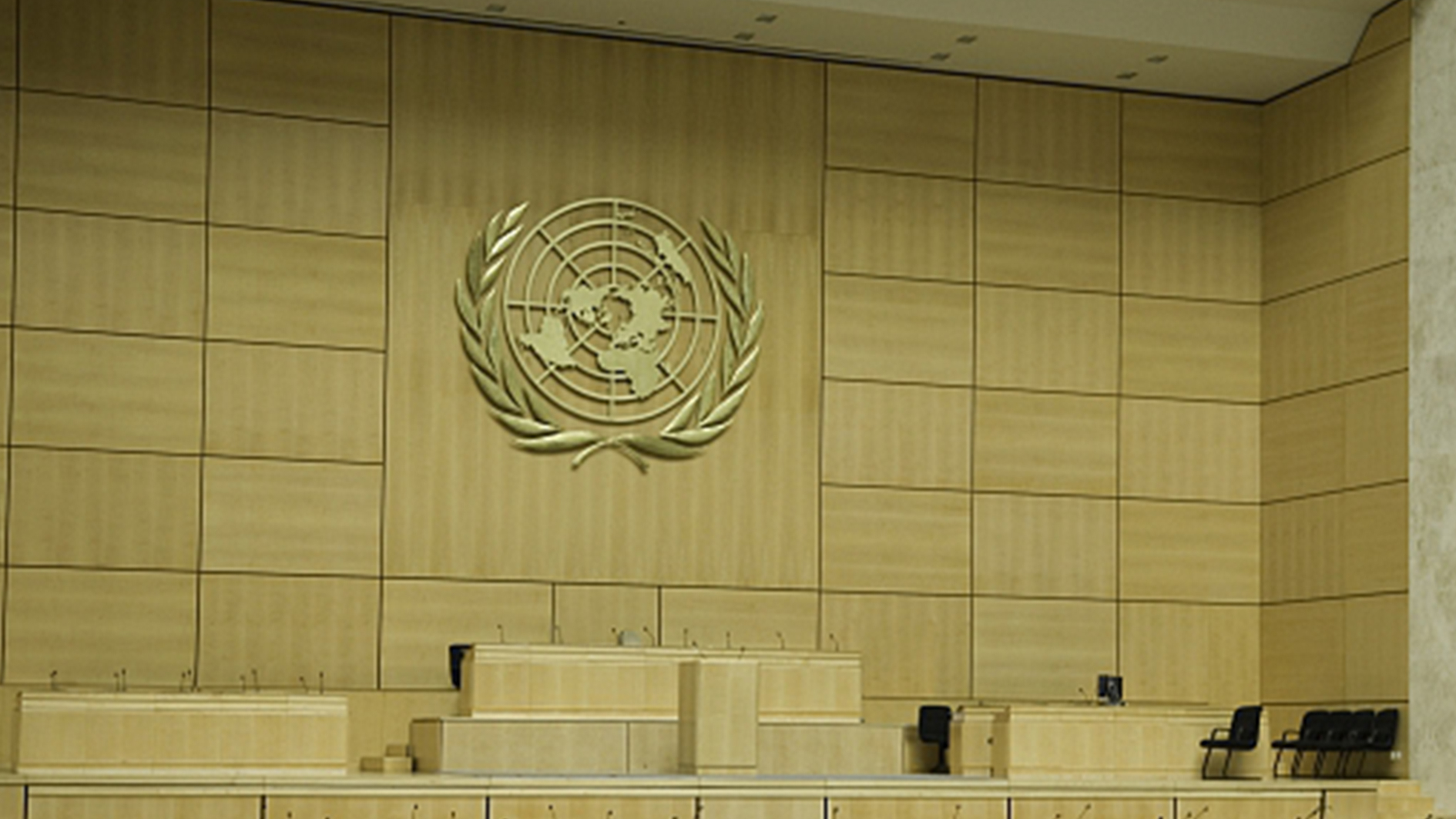

Israel's Prime Minister Benjamin Netanyahu addresses an event in Tel Aviv, Israel, September 10, 2019. /VCG Photo
Israeli Prime Minister Benjamin Netanyahu's pre-election pledge to annex the West Bank's Jordan Valley drew praise from right-wing allies Wednesday, but opponents called it a desperate bid to remain in office.
Netanyahu said in a televised speech he would move to annex the strategic valley, which accounts for around a third of the occupied West Bank, if he wins the vote.
Politicians from smaller parties on the far-right who are competing with Netanyahu for votes called it too little and too late.
"Why talk about annexation one week before the elections when the government can decide to apply it when it wants, and even today?" asked Transport Minister Bezalel Smotrich, part of the far-right Yamina alliance in the upcoming vote.
However, the Yesha Council, an umbrella organization for Israeli settlements in the West Bank, said it was a "historic event."
Netanyahu is fighting for his political life after an inconclusive election in April. His Likud party is running neck and neck in opinion polls with former armed forces chief Benny Gantz's Blue and White.

Retired Israeli general Benny Gantz, one of the leaders of the Blue and White political alliance, greets supporters at the alliance headquarters in Tel Aviv, April 10, 2019. /VCG Photo
Battling to win re-election in September 17 polls, Netanyahu issued the deeply-controversial pledge on Tuesday night, drawing firm condemnation from the Palestinians, Arab states, the United Nations and the EU.
Palestinians: 'Worse than apartheid'
Palestinian leaders said Netanyahu was destroying any hopes for peace, while senior official Hanan Ashrawi said the plans were "worse than apartheid."
Palestinians tilling the fertile Jordan Valley said on Wednesday they have been rooted for generations to the West Bank land that Israeli Prime Minister Benjamin Netanyahu plans to annex, and they vowed never to give it up.
"We tell Netanyahu, and whoever follows him, you will not break the Palestinians' will, you will never break our will, never, never," said Hassan Al-Abedi, a 55-year-old farmer who lives in the village of Jiftlik.
"It's our parents' and grandparents' land. We will hold onto it no matter what it costs."
Palestinian leaders said it would also effectively nullify interim peace deals from the 1990s that included security cooperation.
Against the backdrop of Jordan's desert mountain range to the east, Palestinian farmers tended their crops and worried about their future in an area where the town of Jericho and the River Jordan are reminders of a biblical past.
"This is not Netanyahu's land to give," said Ismael Hassan, a 75-year-old Palestinian from Zbeidat village. "Whether or not Netanyahu succeeds (in the election) we won't accept it. This land is for Palestine, for the Palestinians."
Some 53,000 Palestinians and around 12,800 Israeli settlers live in the Jordan Valley, according to monitor Peace Now. The main Palestinian city in the region is Jericho, with around 28 villages and smaller Bedouin communities.
Palestinians often refer to the Jordan Valley as their "breadbasket." In his speech on Tuesday, Netanyahu described it as Israel's eastern border with Jordan.
The valley, which at 2,400 square kilometers (926 square miles) accounts for nearly 30 percent of the West Bank, has dozens of Palestinian farms as well as open areas that the Palestinian Authority has sought to develop for solar energy projects and industrial zones.

Israeli Prime Minster Benjamin Netanyahu points to a Jordan Valley map during his announcement in Ramat Gan, Israel, September 10, 2019. /VCG Photo
There are some 30 mainly agricultural settlements in the area, along with 18 smaller Israeli outposts, Peace Now says.
"It's impossible to have a Palestinian state without the Jordan Valley," chief Palestinian negotiator Saeb Erekat told Reuters in an interview from his office in Jericho.
"My prosperity can come (only) if I can control my natural resources, my shores on the Dead Sea, my shores on the Mediterranean, my water, my land."
Erekat said the Palestinians would welcome "a third party presence" such as NATO or the EU but said: "An Israeli military or civilian presence in the state of Palestine is not okay, because this will not make peace."
U.S.: Rollout is unlikely to be affected
The Trump administration is expected to release its long-delayed peace plan after Israel’s election, and it is still unclear whether the proposal will adhere to previous U.S. support for the creation of a Palestinian state alongside a secure Israel.
That rollout is unlikely to be affected even if Netanyahu goes ahead with the Jordan Valley annexation plan after the election, a U.S. official said.
Netanyahu's decision to make the promise showed that he had little reason to fear any pushback from the Trump administration, which has hewed to a heavily pro-Israel policy and backed Trump at almost every turn since he took office in 2017.
Following up on his speech with remarks on Facebook on Wednesday, Netanyahu took credit for having persuaded U.S. President Donald Trump to recognize Israeli sovereignty over another strategic slice of occupied territory, the Golan Heights, captured from Syria in 1967, and to relocate the U.S. Embassy to Jerusalem.
The White House was informed in advance of Tuesday's annexation announcement, Netanyahu said, adding that he was "crafting opinion in favor of recognition of Israeli sovereignty in Judea and Samaria and the Jordan Valley."
A U.S. official confirmed Washington had been notified but said the announcement was not coordinated.
World reactions: A threat to peace
Taken together, those moves could essentially destroy any remaining hopes for a two-state solution to the Israeli-Palestinian conflict.

"Such steps, if implemented, would constitute a serious violation of international law," UN spokesperson Stephane Dujarric said.
"They would be devastating to the potential of reviving negotiations and regional peace, while severely undermining the viability of the two-State solution."
An EU statement echoed the UN objection, adding that the plan was a threat to "the prospects for a lasting peace".
"Even Netanyahu's main rivals believe that any Palestinian entity that is established in the West Bank should be completely encircled by Israel, having no border with Jordan," said Nathan Thrall, an International Crisis Group analyst.
"The annexation plan shouldn't be dismissed as election bluster. If reelected, Netanyahu will be under tremendous pressure to implement it."
Jordan's house speaker, Atef al-Tarawneh, said Netanyahu's pledge could put the 1994 peace treaty between the two neighbors "at stake".
One-third of West Bank
The Jordan Valley accounts for around one-third of the West Bank and Israeli right-wing politicians have long viewed the strategic area as a part of the territory they would never retreat from, seeing it as the country's eastern border.
Israeli settlements are located in what is known as Area C of the West Bank, which accounts for some 60 percent of the territory, including the vast majority of the Jordan Valley.
Netanyahu said his annexation plans would not include Palestinian cities, such as the Jordan Valley's Jericho, though it would be encircled by Israeli territory.
Israel occupied the West Bank in the Six-Day War of 1967 in a move never recognized by the international community.
Its settlements there are considered illegal under international law and major stumbling blocks to peace as they are built on land the Palestinian see as part of their future state.
Israel says the Jordan Valley is vital to its security.
(With input from AFP, Reuters)

Copyright © 2018 CGTN. Beijing ICP prepared NO.16065310-3
Copyright © 2018 CGTN. Beijing ICP prepared NO.16065310-3